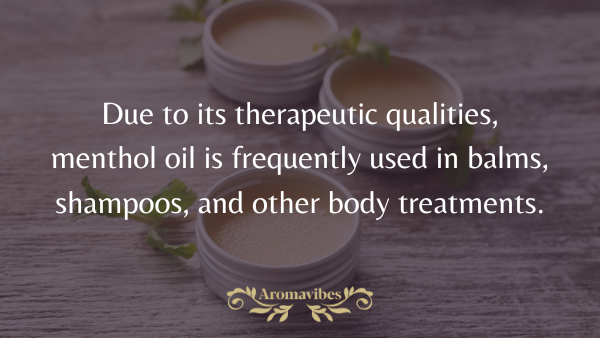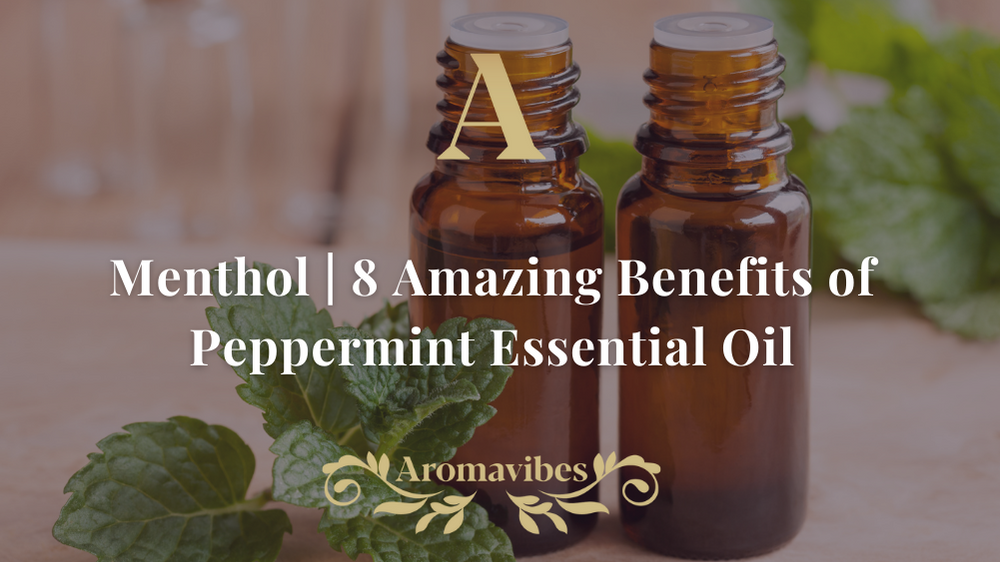One of the most useful essential oils available is peppermint oil. You can apply it topically, orally, or aromatically to relieve a range of health issues including digestive problems, fatigue, and symptoms of seasonal allergies. People also frequently use it to increase energy and enhance the health of both skin and hair. In this article we will examine the 8 amazing benefits of peppermint essential oil as well as it uses!
The flowering plant’s fresh aerial portions are used for cold extraction to obtain the essential oil.
Peppermint comes in a variety of forms, including peppermint leaves, peppermint spray, peppermint tablets, and peppermint essential oil. The active components of peppermint leaves cause the stimulating and energetic properties of peppermint.
Due to its therapeutic qualities, menthol oil is frequently used in balms, shampoos, and other skincare products.

History of Peppermint Essential Oil
In addition to being one of the oldest therapeutic herbs used in Europe, peppermint oil also has a long history in Chinese and Japanese folk medicine.
Greek mythology also referred to this oil when Pluto turned the nymph Mentha (or Minthe), who had fallen in love with her and wanted everyone to enjoy her for years to come, into a fragrant herb.
Since 1000 BC, there have been numerous uses for peppermint oil, and several Egyptian pyramids have been discovered to contain it.

Benefits of Peppermint Essential Oil
1. Relieves Muscle and Joint Pain
An extremely potent natural painkiller and muscle relaxant is peppermint essential oil. It provides cooling, energising, and antispasmodic effects. In particular, peppermint oil is beneficial for easing severe headache symptoms.
Another study demonstrated the benefits of peppermint oil for myofascial pain syndrome and fibromyalgia pain reduction when applied topically. Researchers discovered that topical analgesics such as peppermint oil, eucalyptus, capsaicin, and other herbal remedies may be beneficial.

2. Relieves Allergies
During allergy season, peppermint oil can help your respiratory system to get rid of debris and pollen by relaxing the muscles in your nasal passages. Its expectorant, anti-inflammatory, and energising qualities make it one of the greatest essential oils for allergies.
Peppermint chemicals had potential therapeutic value for the treatment of chronic inflammatory illnesses, such as allergic rhinitis, colitis, and bronchial asthma, according to a laboratory study that was published in the European Journal of Medical Research.

3. Boosts Exercise Performance
A study that was issued in the Avicenna Journal of Phytomedicine looked into how peppermint consumption affected physical activity levels. The experimental and control groups were randomly assigned to 30 healthy male college students. Participants received one dose of peppermint essential oil orally, and their physiological data and performance were recorded. After consuming peppermint oil, researchers saw a significant improvement in each of the evaluated variables. The grip force, upright vertical jump, and standing long jump all increased gradually and significantly in the experimental group. The amount of air exhaled from the lungs, peak breathing flow rate, and peak exhaling flow rate all increased significantly in the peppermint oil group. Considering this, peppermint may have great results for bronchial smooth muscles.
4. Relieves IBS Symptoms
You can treat successfully irritable bowel syndrome organically with peppermint oil capsules (IBS). In addition to relaxing the muscles in your intestines and reducing colon spasms, peppermint oil for IBS can also help you feel less bloated and gassy.
75 per cent of individuals who used it reported a reduction in IBS symptoms of 50% in a placebo-controlled, randomised clinical trial. A majority of the 57 IBS patients who received two peppermint oil capsules twice a day for four weeks as opposed to a placebo saw improvements in their symptoms, including lessening gastrointestinal bleeding, discomfort or pain, diarrhoea, constipation, and urgency while defecating.

5. Relieves Nausea
Several factors might contribute to nausea, which frequently occurs after surgery. After having their post-operative nausea treated with a nasal aromatherapy inhaler containing peppermint oil, 34 patients who had undergone cardiac surgery had much lower levels of nausea than before. On a scale of 0 to 5, with 5 denoting the most nausea, the patients were asked to rate their experiences of nausea. Before the two-minute peppermint oil inhalation, the average score decreased from 3.29 to 1.44.
6. Relieves Itching
According to studies, the menthol in peppermint oil reduces itching. Researchers examined the effectiveness of peppermint in reducing symptoms in a triple-blind clinical research with 96 randomly selected pregnant women who were suffering from pruritus. A frequent issue known as pruritus is characterised by an annoying, persistent itch that won’t go away. Women participated in the trial by applying a peppermint and sesame oil mixture twice daily for two weeks, or a placebo. Researchers discovered a statistically significant difference between the treatment group’s level of itching and the placebo group’s level of itching.
7. Promotes Oral Health
People have been using the peppermint plant to naturally refresh their breath for over a thousand years. This is most likely because peppermint oil eliminates germs and fungi that can cause cavities and infections.
According to a lab study in the European Journal of Dentistry, Staphylococcus aureus, Enterococcus faecalis, Escherichia coli, and Candida albicans were only a few of the oral pathogens that peppermint oil, tea tree oil, and thyme essential oil showed antibacterial activity against.
8. Promotes Healthy Hair
Peppermint essential oil can effectively strengthen and repair damaged strands. It also aids in stimulating the scalp and you can use it as a natural remedy for hair loss. Moreover, menthol is a potent antibacterial, which means that it may help get rid of germs that accumulate on your scalp and hair strands.
Researchers discovered that topical menthol enhances skin blood flow in a 2016 study looking into the effects of menthol. As your scalp may be stimulated by an increase in blood flow, this may also aid in hair development.

Uses of Peppermint Essential Oil
Peppermint oil has a wide range of uses. You can use it with or without a carrier oil to dilute it, and in the right doses, it is safe for both internal and exterior use (when used topically).
Aromatherapy
To effortlessly fill a space with an energetic smell, try adding around five drops to a diffuser. Even your breathing may improve as a result of this type of aromatherapy. There is no need to hold your head over the diffused air when using essential oils; simply adhere to the safety precautions and breathe in the aroma as it fills the space.
Use it to Cook
An amazing, all-natural method to add the benefits of peppermint oil and a great minty punch to foods is by using edible essential oils like peppermint in cooking.
Make a Massage Oil
Peppermint oil is the ideal component for massage oil because it calms, cools, and energises. You should dilute several drops with almond or grapeseed oil.

Final Thoughts
Researchers have documented the cooling, stimulating, expectorant, antibacterial, antispasmodic, energising, and pain-relieving effects of peppermint oil. Although peppermint oil is generally safe, excessively high dosages can be hazardous. Moreover, you should always dilute peppermint essential before usage.
To learn more about peppermint essential oil benefits, you can check NIC, Healthline and WebMd. You can also check Aromavibes for a wide collection of essential oils!

